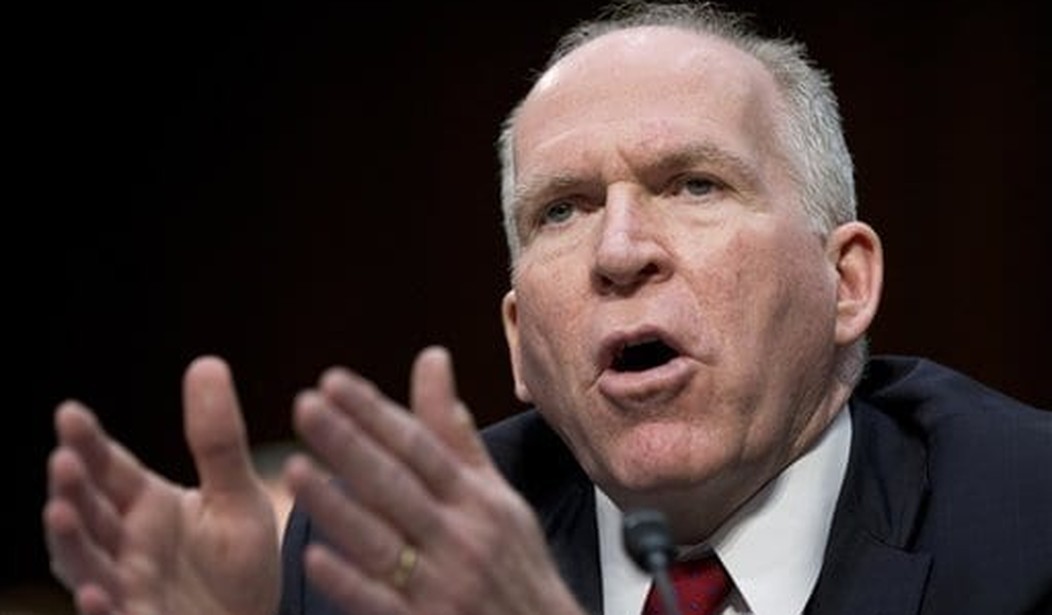If Chuck Hagel’s performance in his confirmation hearing last week was comparable to a deer caught in the headlights, John Brennan’s artificially earnest, overly agreeable performance before the Senate Armed Services Committee today brought to mind a kid imploring his teacher to raise his “B” grade to an “A.”
“If I am confirmed, a trust deficit between the committee and the CIA would be wholly unacceptable to me, and I would make it my goal on day one of my tenure and every day thereafter to strengthen the trust between us,” Brennan told the Senate Intelligence Committee, which has consistently been frustrated by a lack of information-sharing and forthrightness from this White House.
“I have a reputation for speaking my mind, and at times doing so in a rather direct manner, which some attribute to my New Jersey roots,” he continued. “I like to think that my candor and bluntness will reassure you that you will get straight answers from me, maybe not always the ones you like, but you will get answers and they will reflect my honest views. That’s the commitment I make to you.”
And whereas the right bore down on Hagel in that contentious hearing before the Senate Armed Services Committee, the left had their share of frustration from President Obama’s counterterrorism chief, nominated to be the next leader of the CIA, as they sought answers to the administration’s drone program and other aspects of the war on terror.
Numerous protesters were scattered throughout the room, keeping the Capitol Police busy as they stood up in turn — sometimes on their chairs — to hold up signs and shout about drone victims.
“I’m going to say once again that we welcome everyone here, that we expect no clapping. We expect no hissing. We expect no demonstration in this room. This is a very serious hearing. I will stop the hearing, and I will ask the room to be cleared,” Chairwoman Dianne Feinstein (D-Calif.) said after the first outburst.
Two more protesters interrupted Brennan’s opening statement. “The CIA and the Obama administration refuse to even tell Congress. They won’t even tell Congress what countries we are killing children in,” one yelled.
At the fourth interruption, Feinstein suspended the hearing. “I’m going to ask that the room be cleared and that the Code Pink associates not be permitted to come back in,” she said. Protesters got a few minutes to dish to assembled news reporters and photographers before being led out.
Brennan, who joined the CIA at age 24 in 1980, restarted his opening statement with “a special salute to David Petraeus, a patriot who remains, as do all former directors, one of the staunchest advocates of the Agency’s mission and workforce.”
“Simply stated, the need for accurate intelligence and prescient analysis from CIA has never been greater than it is in 2013 or than it will be in the coming years,” Brennan said.
“Historic political, economic and social transformations continue to sweep through the Middle East and North Africa with major implications for our interests, Israel’s security, our Arab partners and the prospects for peace and stability throughout the region. We remain at war with al-Qaeda and its associated forces, which, despite the substantial progress we have made against them, still seek to carry out deadly strikes against our homeland and our citizens, and against our friends and allies.”
Feinstein mainly sought assurances that the Intelligence Committee wouldn’t be stonewalled as usual when requesting documents and full briefings on intelligence matters.
Ranking Member Saxby Chambliss (R-Ga.) asked Brennan about an interview he gave years ago opining the CIA should be out of the detention business. “Your view seems to be that, even if we could save American lives by detaining more terrorists, using only traditional techniques, it would be better to kill them with a drone or let them go free rather than detain them,” Chambliss said.
“I never believe it’s better to kill a terrorist than to detain him,” Brennan said. “…I’m a strong proponent of doing everything possible, short of killing terrorists, bringing them to justice, and getting that intelligence from them.”
Under later questioning from Sen. Marco Rubio (R-Fla.) about who should do detain and interrogate then, Brennan said the military and FBI were options, as well as leaving it up to “international partners.”
“And that’s where, in fact, most of the interrogations are taking place of terrorists who have been taken off of the battlefields in many different countries,” he said. “…The CIA should be able to lend its full expertise, as it does right now, in terms of — in support of military interrogations, FBI debriefings and interrogations and our foreign partner debriefings. And they do that on a regular basis.”
Brennan told Chambliss that he did not take steps to stop the CIA’s use of waterboarding that he now says he found objectionable, and even slipped in a blame-Bush moment.
“I had expressed my personal objections to my — some agency colleagues about certain of those EITs such as waterboarding, nudity, and others, where I professed my personal objections to it, but I did not try to stop it because it was, you know, something being done in different part of the agency under the authority of others,” he said. “And it was something that was directed by the administration of the time.”
No one has come forward, though, to confirm that Brennan indeed voiced concern about the program, and in fact his former boss told the Wall Street Journal he had a role in setting the parameters of the program.
Sen. Carl Levin (D-Mich.) tried unsuccessfully to get Brennan to call waterboarding torture.
“The attorney general has referred to waterboarding as torture. Many people have referred to it as torture,” Brenna responded. “And as you well know and as we’ve had the discussion, Senator, the term ‘torture’ has a lot of legal and political implications. It is something that should have been banned long ago. It never should have taken place in my view. And, therefore, it is — if I were to go to CIA, it would never, in fact, be brought back.”
“Do you have a personal opinion as to whether waterboarding is torture?” Levin asked again.
“I have a personal opinion that waterboarding is reprehensible and it’s something that should not be done. And, again, I am not a lawyer, Senator, and I can’t address that question,” Brennan said.
Sen. Richard Burr (R-N.C.) followed this up a bit later with a waterboarding joke.
“I’m gonna try to be brief, because I’ve noticed you’re on your fourth glass of water, and I don’t want to be accused of waterboarding you,” he told the nominee.
On the controversial subject of drone strikes, Brennan told Feinstein her committee should want to protect certain covert activities.
“The president has insisted that any actions we take will be legally grounded, will be thoroughly anchored in intelligence, will have the appropriate review process, approval process before any action is contemplated, including those actions that might involve the use of lethal force,” he said.
Sen. Jay Rockefeller (D-W.Va.) predicted “the drones are going to grow.”
“There’s going to be more and more of that warfare, not just by us, but by other countries, including perhaps by people from within our own country,” he said.
The most anticipated drone critic of the day, though, was Sen. Ron Wyden (D-Ore.).
“What do you think needs to be done to ensure that members of the public understand more about when the government thinks it’s allowed to kill them, particularly with respect to those two issues: the question of evidence and the authority to use this power within the United States?” Wyden asked.
“What we need to do is make sure we explain to the American people what the thresholds for action, what are the procedures, the practices, the processes, the approvals, the reviews,” Brennan said. “…And, in fact, I think the American people would be quite pleased to know that we’ve been very disciplined and very judicious, and we only use these authorities and these capabilities as a last resort.”
“If the executive branch makes a mistake and kills the wrong person or a group of the wrong people, how should the government acknowledge that?” Wyden continued.
Brennan said acknowledging that publicly “would be ideal and that would be the objective of the program.”
Wyden has been seeking a full list of countries in which the intelligence community “has used its lethal authorities.” If confirmed, Brennan said, “I would get back to you.”
“If I were to go to CIA and the CIA was involved in any type of lethal activity, I would damn well make sure that this committee had that information,” he eagerly added. “Absolutely.”









Join the conversation as a VIP Member